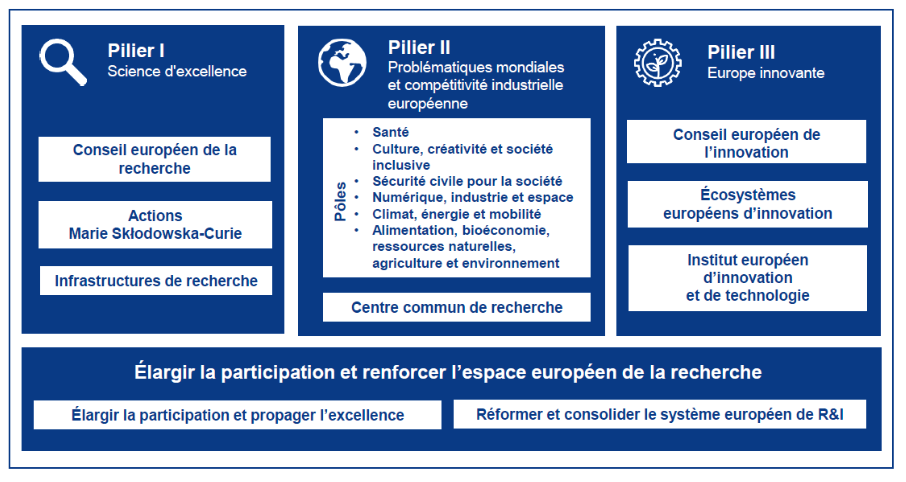European projects
The involvement of mathematicians from Insmi-related units in European framework programmes, in particular the European Research Council, raises the profile of French mathematics and promotes scientific excellence and cooperation in Europe. European projects offer numerous funding opportunities and are a springboard for recognition and excellence.
Consult the list of ERC winners from Insmi laboratories
Insmi's European strategy
The Insmi's strategy is based on the CNRS "Europe" roadmap.
Horizon Europe programme
Horizon Europe is the EU's framework programme for research and innovation for the period 2021-2027. With a budget of €95 billion, it is based on 4 pillars:

Since 2007, the ERC has funded
- more than 12,000 projects
- More than 10,000 researchers
More than 75,000 post-docs, PhD students and other staff are employed in the research teams of the selected projects.
More than 200,0000 articles have been published and more than 85 nationalities are represented among the recipients.
Pillar 1: Science for excellence
This pillar is endowed with €25 billion and supports basic research projects with human resources and infrastructure, through the ERC (European Research Council) and Marie Skłodowska-Curie Actions (MSCA), as well as Research Infrastructures (ESFRI).
- Good to know: This pillar is where the vast majority of prizewinners in the mathematical sciences are to be found, particularly in the ERC, which has a budget of €16 billion over 7 years.
Pillar 2: Global issues and European industrial competitiveness
Organised into clusters, this pillar proposes projects in which mathematics can also be present in areas relating to
- health ;
- culture, creativity and an inclusive society; and
- civil security for society
- digital, industry and space; and
- climate, energy and mobility;
- food, bioeconomy, natural resources, agriculture and the environment.
Within these 6 clusters, 5 Mission areas have been identified:
- Cancer
- adapting to climate change
- smart, carbon-neutral cities; and
- soil health and food
- the health of oceans, seas, coastal and continental waters.
Pillar 3: A more innovative Europe
This pillar aims to support innovation in conjunction with the national and local levels. It also addresses the need to organise European innovation ecosystems. It creates a European Innovation Council (EIC) and support for the European Innovation Ecosystems and the European Institute of Innovation and Technology (EIT).
Cross-cutting pillar 4: Widening participation and strengthening the European Research Area
The aim of this pillar is to increase participation in the Framework Programme by Member States or associated countries that are considered to be "less successful", and to attract talent, promote its movement and prevent the brain drain outside the European Union. This pillar strongly encourages transnational collaboration. This is where calls for projects such as COST, Widening, ERA, etc. come in.